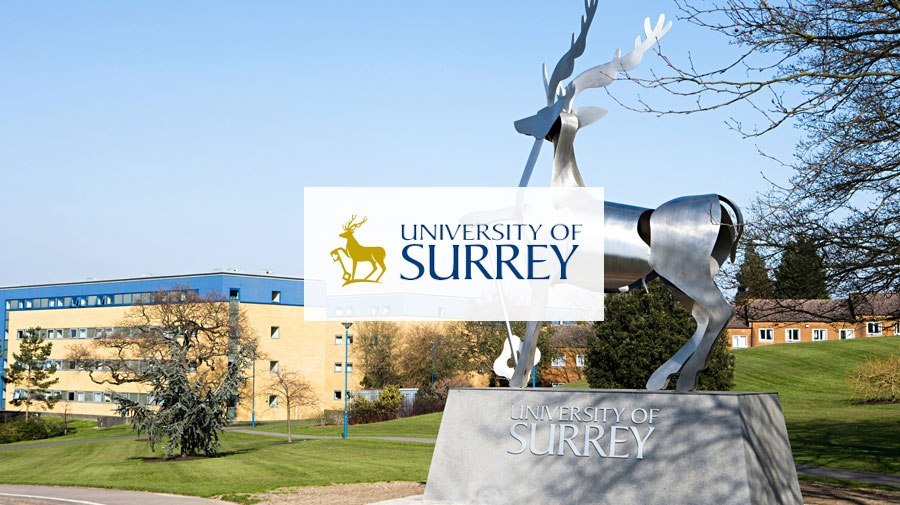Chemistry PhD
Why choose this course
Studying a Chemistry PhD at Surrey, you will join an internationally-renowned and research-active department with a strong track-record of employability and research excellence.
Our Department of Chemistry has a small-medium sized PhD cohort and is home to an intimate and collegiate working community. Our small group sizes mean that you will receive close and careful supervision and easy access to all the help and support you need to succeed. In the Department there is a long tradition of close interaction between supervisor and student.
The Department’s research interests span much of the discipline of Chemistry. Many of the research themes are aimed at solving real-world problems, from supplying clean energy, through the discovery of new drugs and drug delivery systems, to analysis of ever more challenging forensic samples. This focus will provide you with the opportunity to undertake research with the potential to benefit society. Much of our research is published in some of the foremost journals in the world, allowing our PhD students to witness the impact their work has in their particular field of research. Our PhD students have an excellent record of winning prizes for oral and poster presentations at scientific meetings not only within the University but at national and international levels. Within our Department, we encourage all of our PhD students to attend and to present at meetings.
What you will study
Our Chemistry PhD will deepen your understanding of the latest advances in synthetic and medicinal chemistry, natural products chemistry, materials chemistry, inorganic chemistry, fuel cell research, nanotechnology, environmental, forensic and computational chemistry. A suitable project can be proposed or outlined by your supervisor. This is a novel piece of research that is expected to take the subject forward and ultimately contribute to the advancement of chemical knowledge.
Research, generally laboratory-based, takes place over most of a three-year period. A thesis or dissertation is written during the last few months. This examination is typically by an expert in the field who is external to the University, and by another who is internal. Throughout the writing up process, both during the PhD, and for the final submission, you can count on the help and support of your supervisor.
There are induction programmes, both University and Departmental based, formal and informal, during the first few months, depending on the nature of the research. There are regular formal reviews (six monthly intervals) to ensure that progress is maintained.
As a PhD student you will be expected to develop real critical analysis skills, to interpret novel results and change, even if in a small way, how we think about the field. Initially, this is likely to be very much in consultation with your supervisor, but as your PhD progresses you will increasingly apply these skills independently. Chemistry is the archetypal laboratory science, but not all research takes place exclusively in a traditional laboratory. Many projects involve computational studies, field work, and interaction with other institutions and with industry.
You will develop your laboratory skills and become familiar with a wide range of advanced instrumentation. You will also develop excellent reasoning and presentational skills. As part of this aim, you will be expected to present your progress at various opportunities and to defend your work where necessary, for example, at the confirmation exam.
Research support
The professional development of postgraduate researchers is supported by the Doctoral College, which provides training in essential skills through its Researcher Development Programme of workshops, mentoring and coaching. A dedicated postgraduate Careers and Employability team will help you prepare for a successful career after the completion of your PhD.
Research themes
- Computational chemistry
- Materials chemistry
- Natural products chemistry
- Radiochemistry
- Medicinal chemistry
- Forensic analysis
- Polymers
- Environmental chemistry
- Inorganic chemistry.
Intakes
- Jan
- April
- July
Application Processing Time in Days: 20
Minimum English Language Requirements
| English Level Description | IELTS (1.0 -9.0) | TOEFL IBT (0-120) | TOEFL CBT (0-300) | PTE (10-90) | |
|---|---|---|---|---|---|
| Expert | 9 | 120 | 297-300 | 86-90 | |
| Very Good | 8.5 | 115-119 | 280-293 | 83-86 | |
| Very Good | 8 | 110-114 | 270-280 | 79-83 | |
| Good | 7.5 | 102-109 | 253-267 | 73-79 | |
| Good | 7 | 94-101 | 240-253 | 65-73 | |
| Competent | 6.5 | 79-93 | 213-233 | 58-65 | |
| Competent | 6 | 60-78 | 170-210 | 50-58 | |
| Modest | 5.5 | 46-59 | 133-210 | 43-50 | |
| Modest | 5 | 35-45 | 107-133 | 36-43 | |
| Limited | 4 | 32-34 | 97-103 | 30-36 | |
| Extremely Limited | < 4 | < 31 | < 93 | < 30 |
Admission Requirement / Eligibility Criteria
Applicants are expected to hold a first or upper-second class degree in a relevant discipline (or equivalent overseas qualification), or a lower second plus a good Masters degree (distinction normally required).
- Course Type: Full Time
- Course Level: Doctoral Degree/PhD
- Duration: 04 Year
-
Total Tuition Fee:
85600 GBP
Annual Cost of Living: 9207 GBP
Application Fee: N/A

